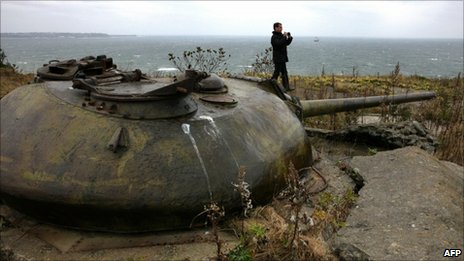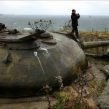
Moscow Explores Asia-Pacific Security Role
Publication: Eurasia Daily Monitor Volume: 8 Issue: 36
By:

Moscow’s apparently random decision to increase tensions with Tokyo over the disputed Kurile Islands provoked anxiety among international observers. Yet, the recent surge in bilateral diplomatic heat over the issue should not be regarded as unexpected or necessarily as an illustration of Moscow picking a fight, even if only at a virtual level. The recent visits to the Kuriles by senior Russian defense officials and military personnel were long-planned and consistent with the general course of reforming the conventional armed forces as well as elements of the Russian operational-strategic exercise Vostok 2010, which witnessed a controversial rehearsal of the defense of Etorofu Island (Novvy Region, July 6, 2010). Follow-up trips by Russian defense officials were inevitable, particularly in the aftermath of the controversy elicited by President Dmitry Medvedev’s visit to the islands in November 2010.
Confusion in Russian media coverage concerned precisely how the military infrastructure will be modernized, or the nature of plans to reinforce and reform the existing 18th Machine-Gun and Artillery Division. Some reports suggested this division may be transformed into a Motorized Rifle Brigade with no change to personnel numbers, while others speculated on the possible deployment of an air defense brigade, which was later denied (Interfax, RIA Novosti, February 15).
Tracing the sequence of the defense ministry visits to the islands, places these moves as part of a wider political-military trend. On January 20-22, as part of a wider inspection process in the Far East Military District/Joint Strategic Command (MD/OSK) a defense ministry commission led by Colonel-General Dmitry Bulgakov, conducted a three-day inspection of units in the islands of Iturup and Kunashir. The focus on the level of combat training and logistical support resulted in an order to increase provisions for the remote base and improve combat training. Fuel and lubricants delivered to the base has been raised by 3,000 to 4,000 tons and is aimed at intensifying combat training. A system of service maintenance to support the military base will be formed, outsourcing laundry and catering services. An official spokesman for the armed forces rear services confirmed that selection of personnel to man a supporting sub-division is in progress (Krasnaya Zvezda, February 5).
On February 4, Defense Minister, Anatoliy Serdyukov, inspected the 18th Machine-Gun and Artillery Division, visiting its headquarters at Goryachiye Klyuchi, examining barracks, canteen, laundry units and a bakery. Serdyukov stated: “From 2011 we are beginning to work under a new state armament program. I think we will plan a replacement of military armaments and hardware in this division. Also, we shall take decisions on improving the social and everyday living conditions.” The defense minister also heard views and proposals from officers wives’ linked to improving conditions for servicemen (Zvezda TV, February 4). By March 1, the defense ministry will finalize a program to modernize the military assets and will examine lengthening the runway at Burevestnik airbase (https://eng.kremlin.ru/news/1751, February 9). Further visits by Russian defense officials and military engineers will occur prior to commencing modernization work.
Also on February 4, President Medvedev announced that visits to the Kuriles by top Russian officials will continue and are linked to the need to attract investment to the islands. By February 7, Russian presidential aide Sergey Prikhodko reminded the Japanese that the Kurile Islands are the Russian Federation’s sovereign territory, which will not be subject to revision. Prikhodko was asked by journalists about the statement by Japan’s Prime Minister, Naoto Kan, in which he characterized Medvedev’s visit to the Kulires in November 2010 as an “outrage,” the presidential aide suggested that Tokyo can expect such trips in future (Interfax, February 7).
On the same day, Viktor Pavlyatenko, the Director of the Japanese Studies Center, in the Far East Institute in Moscow placed the re-emergence of the dispute in the longer-term context of the bilateral relationship, and linked the toughening of the Kremlin’s position to domestic issues within Japanese politics. “The opposition is demanding the dissolution of parliament. Leading Japanese politicians are saying that there is a time limit to the current authorities’ term in power,” Pavlyatenko said adding that the Japanese prime minister’s remarks were viewed as excessively tough even in Japan itself (Ekho Moskvy, February 7).
Indeed, Japanese domestic politics as a factor was reinforced by Aleksey Makarkin, the First Vice-President of the Moscow-based Center for Political Technologies, who suggested that Moscow prefers to deal with the liberal-democrats, rather than Democratic Party which won the 2009 elections. “The Japanese also have qualms about the position of the Naoto Kan cabinet on the Kuriles question –the brief recall of the ambassador in Russia last year after Medvedev’s visit to the southern Kuriles did not satisfy Japanese patriots. Therefore, now Prime Minister Kan is most actively demonstrating his patriotism,” Makarkin asserted (Kommersant, February 11).
Makarkin noted that the absence of a positive dynamic in Russian-Japanese relations is likely to persist, and said the visits to the Kuriles by Medvedev, First Deputy Prime Minister Igor Shuvalov, Regional Development Minister Viktor Basargin, as well as Serdyukov are highly popular among the Russian public. The emphatically inflexible posture over the Kuriles is in stark contrast to the foreign policy of the Perestroika era, which in the popular perception is regarded as a period of weakness and unilateral concessions. Moreover, Makarkin highlighted Moscow’s paramount interest as it looks east is China. Beijing’s $25 billion loan to Rosneft and Transneft during the economic crisis in exchange for Moscow building a branch of the East-Siberia-Pacific Ocean pipeline to carry Russian oil to China, promoting “strategic partnership,” and the unstoppable rise of its eastern neighbor are factors driving the Kremlin to view not Japan, but the US as a geopolitical counterbalance to China in the Asia-Pacific Region (Kommersant, February 11).
Moscow’s interest in understanding how China might perceive the public diplomacy over the Kuriles may have featured in upping the rhetoric. Xinhua news agency carried a background report on the dispute on February 12, which referred to Russia’s strategic interests in the islands as a gateway to the Pacific Ocean. Five days later, a Chinese foreign ministry spokesman called on both countries to act responsibly in the dispute. “The issue regarding the four northern islands is a bilateral issue between Russia and Japan, and we hope the two sides will properly handle the issue through talks,” spokesman Ma Zhaoxu told a press conference (Xinhua, February 12, 17). The apparently bland statement confirmed Beijing’s watchful interest.




